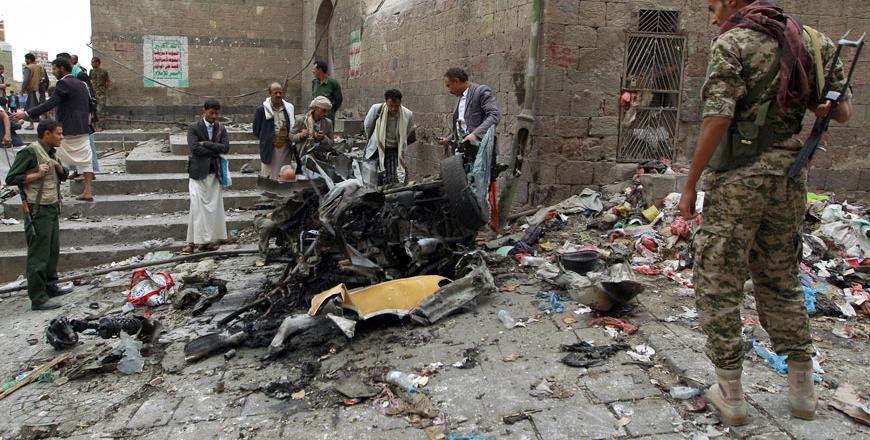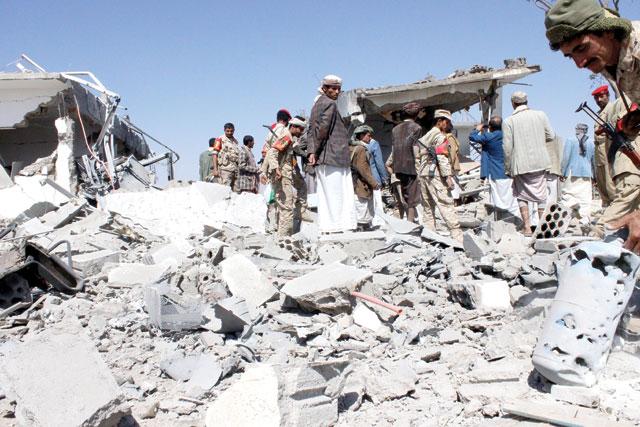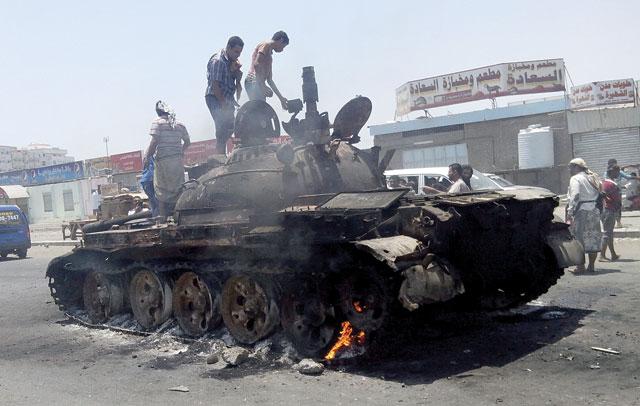You are here
Yemen hit by deadly car bomb, air strikes as talks fail
By AFP - Jun 20,2015 - Last updated at Jun 20,2015

Yemenis surround the wreckage of a vehicle outside the Kobbat Al Mehdi Shiite Mosque in the capital Sanaa on Saturday, after a car bomb targeting the area killed two people (AFP photo by Mohammed Huwais)
Sanaa — A car bomb near a mosque in Yemen's capital Saturday killed two people, as Saudi-led warplanes bombarded second city Aden, after peace talks in Geneva ended without agreement.
The explosion in Sanaa, controlled by Iran-backed Shiite Houthi rebels, went off outside the Kobbat Al Mehdi Mosque as Shiite Muslims emerged from midday prayers, witnesses and security sources said.
As well as the two dead, another 16 people were wounded, medical officials said.
The blast, which comes as Muslims observe the fasting month of Ramadan, damaged the entrance of the mosque and shattered the windows of a nearby house, an AFP photographer reported.
The Daesh terror group claimed responsibility for the attack, SITE Intelligence Group reported, the latest in a series that has targeted Sanaa, which the Houthi rebels seized in September.
Since then they have expanded their control to other parts of Sunni-majority Yemen, including Aden in the south, forcing President Abed Rabbo Mansour Hadi and his government to flee to Saudi Arabia.
On Wednesday, at least 31 people were killed and dozens wounded in five simultaneous bombings, also claimed by the radical Sunni Muslim jihadist group at Shiite mosques and offices in Sanaa.
Saturday's car attack came hours after Saudi-led warplanes launched 15 strikes against Houthi targets in the port city of Aden.
A pro-government military source said the dawn strikes pounded the northern, eastern and western approaches to Aden, to isolate the Houthis and support forces loyal to Hadi.
"The objective is to close the noose around the Houthi rebels in Aden and assist the Popular Resistance Committees," said the source.
Anti-rebel forces comprising pro-government fighters, Sunni tribes, and southern separatists are referred to as Popular Resistance Committees.
They have been locked in fierce fighting against the Houthis in Aden, which has been devastated by Saudi-led strikes launched in March in support of Hadi.
On Saturday the rebels shelled several neighbourhoods of Aden, killing four people and wounding several others, the military source said, a toll confirmed by hospital officials.
Peace talks deadlocked
The violence came after UN’s special envoy for Yemen Ismail Ould Cheikh Ahmed announced Friday in Geneva that talks between the warring sides ended without agreement.
“I won’t beat around the bush. There was no kind of agreement reached,” the Mauritanian diplomat told reporters.
Yemen’s rivals blamed each other for the deadlock.
“I am disappointed. We did everything to make the talks a success but there were too many obstacles, especially the demand for a withdrawal,” rebel delegation head Hamza Al Houthi told AFP.
Yemen’s exiled foreign minister blamed the lack of progress on the rebel delegation.
“We really came here with a big hope... but unfortunately the Houthi delegation did not allow us really to reach real progress as we expected,” said Riad Yassin.
The government is demanding in line with a UN Security Council resolution that the rebels withdraw from the territory they control, but the Houthis have called for an unconditional halt to the air strikes before they consider a pause in fighting.
The rebels are backed by fighters loyal to former president Ali Abdullah Saleh, who was forced to step down after a year of bloody protests calling for an end to his three decades of iron-fisted rule.
More than 2,600 have been killed in the fighting which has also left 80 per cent of the population — 20 million people — in need of urgent humanitarian aid, according to UN estimates.
The situation is particularly grave in Aden, where residents have complained of food and water shortages, while medics speak of a rapidly deteriorating health situation and the spread of disease.
A boat laden with supplies, including flour, that was due to dock in Aden this week had to divert course to Hodeida in western Yemen due to the fighting, said Aden Deputy Governor Nayef Al Bakri.
He accused the Houthis of deliberately forcing the vessel, chartered by the UN’s World Food Programme, to change course because they control the port in Hodeida.
Related Articles
An air strike killed at least 40 people at a camp for displaced people in north Yemen on Monday, humanitarian workers said, in an attack which apparently targeted a nearby base for Houthi fighters battling President Abed Rabbo Mansour Hadi.
Yemen's President Abed Rabbo Mansour Hadi left his refuge in Aden under Saudi protection on Thursday and arrived in Saudi Arabia as Houthi rebels battled with forces still loyal to him on the outskirts of the southern port city.
Saudi-led warplanes bombed Yemen's main international airport and struck a renegade troop base in the capital, as Arab leaders vowed Sunday to pummel Iranian-backed rebels until they surrender.













